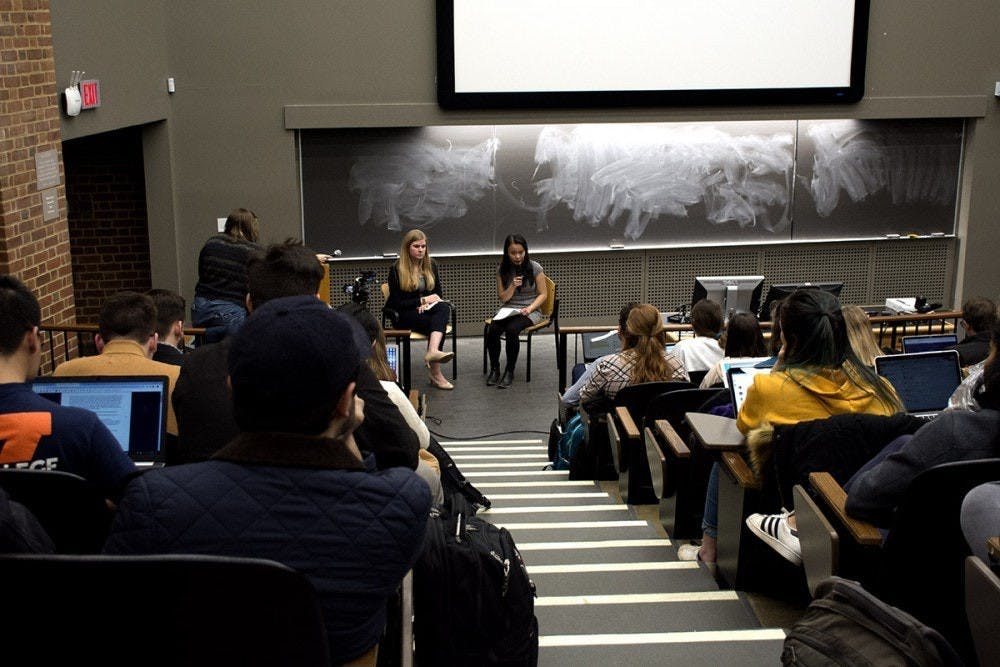Voting plays a central role in the culture of the University. From the start of school to Election Day, students are bombarded by their eager peers with clipboards outside dining halls, the Corner and their dorms, asking “are you registered to vote on Grounds?” Other students work the partisan angle, knocking on doors and making phone calls for their candidate of choice. Students at the University overwhelmingly vote in federal, state and local elections. In 2016, 63.9 percent of University students voted in the presidential election, exceeding the national campus average of 50.4 percent. Despite the culture around voting at the University, students fail to vote in their most local elections — University-wide elections. However, in order to fully participate students must understand the functions of the institutions that represent them in order to have an incentive to vote.
Student self-governance is one of those buzzwords thrown around by University administration, but what does it actually mean? According to U.Va.’s website, “the University wasn’t created just to educate. It was created to prepare a new generation and a new nation to govern and to lead — producing a culture that places responsibility, along with the power to change, directly in students' hands.” Aligning with this culture, students take on leadership positions with great responsibility, ranging from carrying out honor sanctions to appropriating the Student Activities Fee. Through student self-governance, students assume tasks that are typically carried out by administrators at similar institutions. These “real life” experiences serve to prepare students for life after graduation — through leadership positions, students are poised to tackle challenging work situations, think critically and manage a myriad of tasks. After all, at the University “leadership is isn’t just an elective. It’s a way of life.”
Even though leadership is often considered to be “the way of life” at the University, many students are unaware of the structure, functions and procedures of many of the student-led organizations that represent them. Starting with Orientation, first-years are immediately indoctrinated into the culture of student self-government without any formal introduction. Outside of the silos of Student Council, Honor Committee, Class and College Councils and University Judiciary Committee, the student body is largely in the dark about the roles of these organizations. They may occasionally receive emails or read articles about current events at the University — Honor’s bicentennial report or the weekly Student Council General Body Meeting — but that is the extent of the majority of students’ interaction with these organizations. When University-wide elections roll around in late February, it comes as no surprise less than 20 percent of students cast a ballot. It is impossible to expect students to have an opinion about elections for organizations which they know little to nothing about.
Information about Student Council, Honor and UJC is readily available. With a quick Google search, the bylaws, constitutions, officers and meeting times of these organizations can be easily accessed. Moreover, the activities of Honor, UJC and Student Council are often updated on social media platforms with student members posting about upcoming meetings and initiatives and student media groups, such as The Cavalier Daily, reporting on their initiatives. Although information about these organizations is readily available on many different platforms, the onus is on students to seek it out themselves. Relying on curious students does not produce an effective voting population — there must be an institutional mechanism to educate the student body on the importance of self-governance at the University.
To increase student voter turnout, students must become knowledgeable of the positions and institutions which they cast their ballot for. This burden of education should not rest solely on the student, but rather should be shared by the student, University Board of Elections and the University administration. Considering UBE oversees the First Year and Housing and Residence Life elections in the fall and the general University-wide elections in the spring, it should also be their duty to ensure an educated voting population. During the interim period between these elections, UBE should provide the student population the tools to understand their ballot come February. An online module should be introduced, focusing on the duties of the offices elected in University-wide elections. Additionally, there should be more emails and a greater social media presence from UBE leading up to the election period.
University-wide elections determine the future leaders of the University. These student leaders hold a great deal of power, representing the interests of the student body to the administration, media and general public. In order to accurately reflect the interests of the student body to these institutions, our leaders must be elected to office with more than 18 percent of the students turning out. In order to increase the number of students participating in the University’s election, there must be a concerted effort between UBE, student leaders and University administration to ensure students are educated enough to make an informed decision during elections.
Mary Alice Kukoski is an Opinion Columnist for The Cavalier Daily. She can be reached at opinion@cavalierdaily.com.







